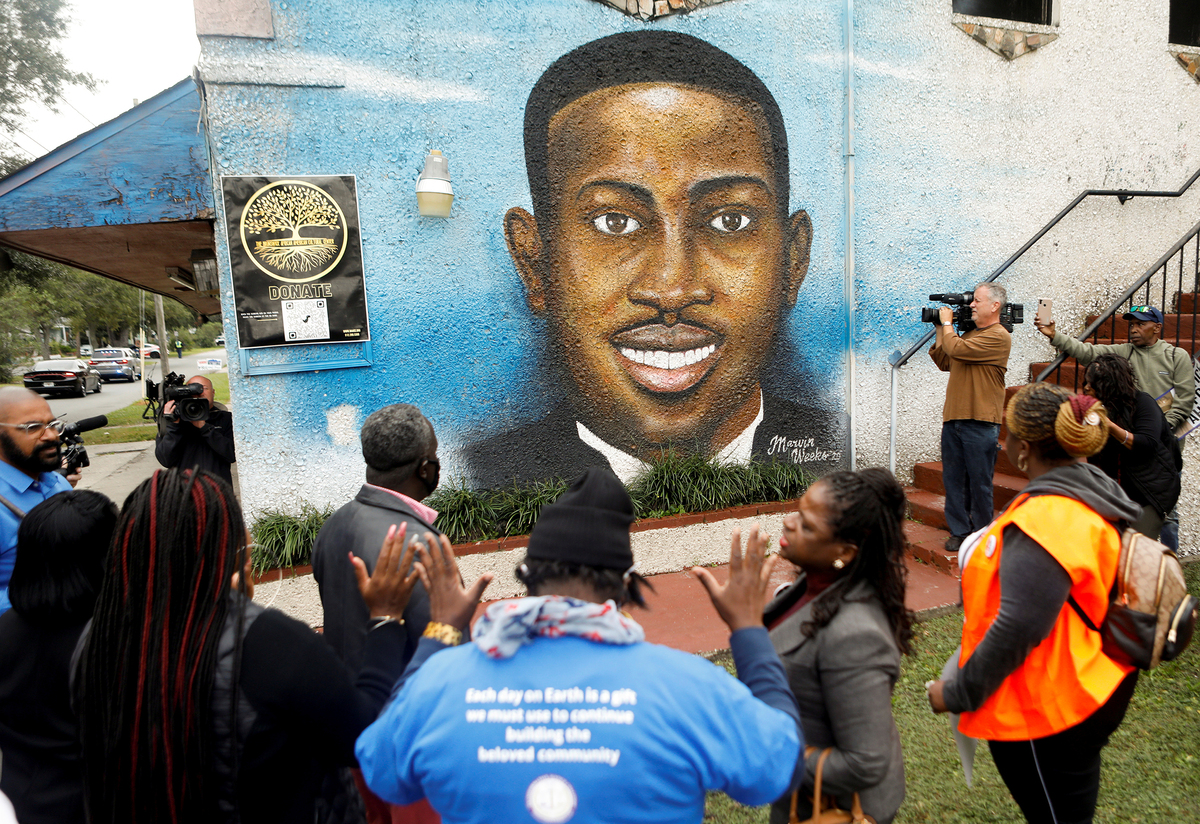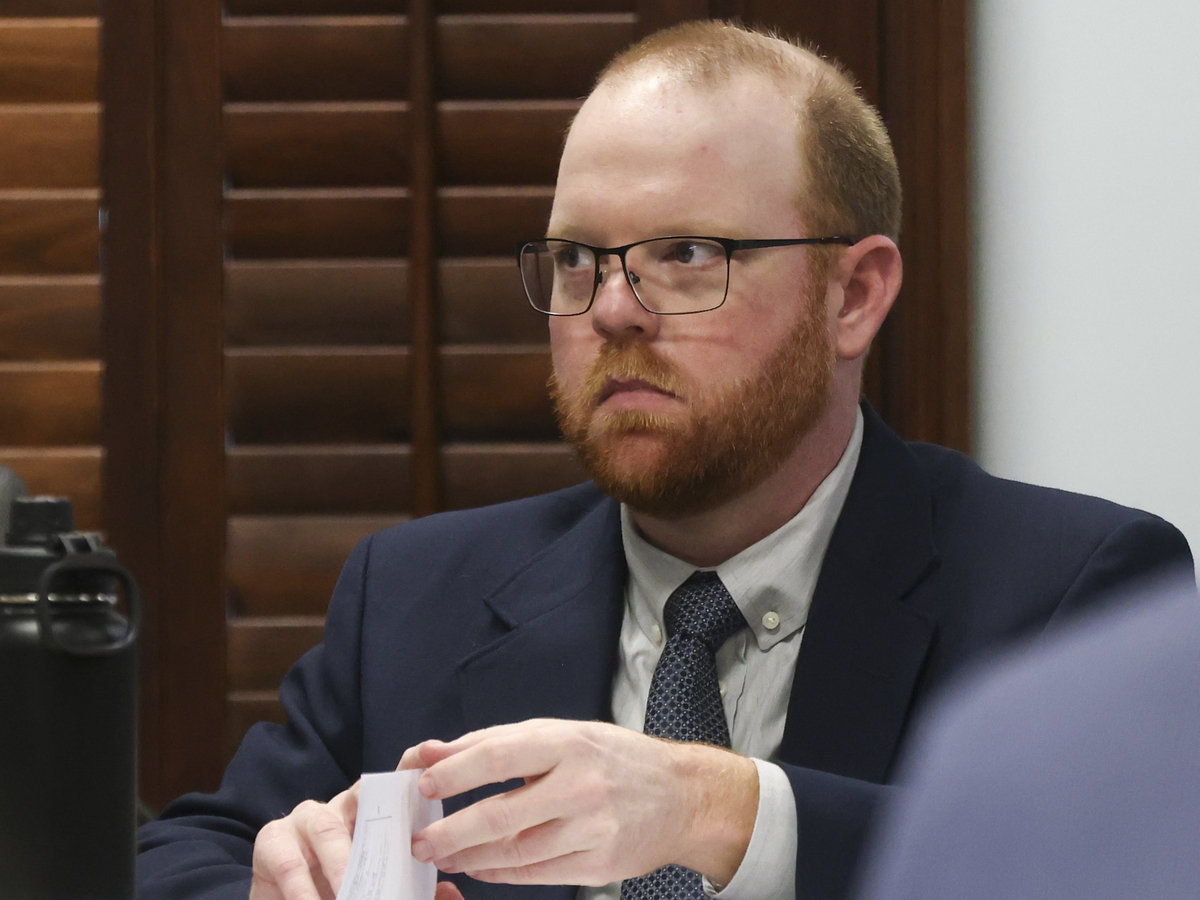
[ad_1]

People gather in front of a mural of Ahmaud Arbery painted on the side of The Brunswick African American Cultural Center in Brunswick, Ga., on Thursday.
Octavio Jones/Reuters
hide caption
toggle caption
Octavio Jones/Reuters

People gather in front of a mural of Ahmaud Arbery painted on the side of The Brunswick African American Cultural Center in Brunswick, Ga., on Thursday.
Octavio Jones/Reuters
Opening arguments in the trial over Ahmaud Arbery’s killing have started, with Travis McMichael, his father, Gregory McMichael, and their neighbor William “Roddie” Bryan facing murder charges.
The three white men are accused of chasing Arbery, a Black man, through a neighborhood in Glynn County, Ga., and shooting him to death with a shotgun.
Arbery, 25, was chased and killed on Feb. 23, 2020, after he was seen running on a street in the Satilla Shores neighborhood. His family says he was just out for a Sunday afternoon jog. Arbery’s relatives have called his death a modern-day lynching.
The defendants say Travis McMichael shot Arbery three times in self-defense, as the McMichaels and Bryan attempted to make a citizen’s arrest under the belief that Arbery might be connected to thefts from an under-construction house.
Ten weeks passed between Arbery’s death and the first arrests in the case, after a video of the killing became public.
It took nearly three weeks to select a jury for the trial, as prosecutors and defense attorneys looked to exclude anyone who seemed unlikely to hear their side of the case with an impartial ear.
The 12-person jury includes 11 white people and one Black person, despite Black potential jurors making up one fourth of the final pool. The panel also has four alternates. The trial is expected to last around two weeks, attorneys said during the selection process.
Who are the defendants in the case?

Travis McMichael, his father and a family friend are facing murder charges over the killing of Ahmaud Arbery in February of 2020. He’s seen here in a courthouse in Brunswick, Ga.
Octavio Jones/Pool/ Getty Images
hide caption
toggle caption
Octavio Jones/Pool/ Getty Images

Travis McMichael, his father and a family friend are facing murder charges over the killing of Ahmaud Arbery in February of 2020. He’s seen here in a courthouse in Brunswick, Ga.
Octavio Jones/Pool/ Getty Images
Gregory McMichael, 65, worked in law enforcement for decades, including a long stint as an investigator for the district attorney’s office in Brunswick. After spotting Arbery, McMichael told police that he grabbed his .357 Magnum pistol and told his son, “Travis the guy is running down the street let’s go.”
Travis McMichael, 35, shot and killed Arbery with a 12-gauge shotgun after chasing him in his Ford F-150 pickup. He is a former member of the Coast Guard.
William “Roddie” Bryan, 52, is the neighbor who jumped into his Chevrolet Silverado pickup to help chase Arbery. He used his cellphone to record video of the final moments of the confrontation.
What will the trial include — and not include?
Prosecutors won two victories the day before opening arguments began, with Judge Timothy Walmsley largely siding with their views on evidence that will be allowed in court. Here’s a quick rundown:
Toxicology reports on Arbery: Lead prosecutor Linda Dunikoski says they’re irrelevant, as Arbery had zero blood alcohol content. She said a follow-up screening for prescription drugs found a “minute” amount of THC, the psychoactive agent in cannabis.
Defense attorney Jason Sheffield said Arbery was diagnosed with schizoaffective disorder in 2018, and he wants an expert to testify whether that, in combination with THC, could make someone aggressive or combative. The judge has already ruled Arbery’s mental health history won’t be part of the trial; he says the traces of THC won’t either.
Officer body-cam video: The McMichaels’ attorneys sought to block what they called “inflammatory” portions of video from an officer’s body-worn camera. The footage, from the second officer who arrived at the scene, includes a close-up view of Arbery’s body as he lay on the ground after being shot.
Prosecutors responded by saying that the images are “real” — that they accurately show what happened. The judge ruled the full video will be included in the trial. He added that anyone who needs to leave the courtroom during the moments when it’s shown should feel free to do so.
Arbery’s probation status: The judge also granted the state’s motion not to include information about Arbery’s probation status. The defense had said it wanted to introduce that as a possible reason why Arbery would want to flee.
License plate: In another ruling, the judge denied the defense’s attempt to suppress images of the vanity license plate on the front of Travis McMichael’s truck, which depicts the former Georgia state flag — a banner that was replaced in the early 2000s because it evoked Confederate imagery.
What are the charges?
A grand jury indicted Gregory and Travis McMichael and William Bryan on nine criminal counts in Georgia state court, including felony murder, aggravated assault and false imprisonment.
The June, 2020, indictment accuses the men of using their pickup trucks to chase and assault Arbery before using a 12-gauge shotgun to shoot and kill him.
Along with the state charges, a federal grand jury indicted the McMichaels and Bryan on hate crime charges in April.
The federal charges also include the attempted kidnapping of Arbery, and the McMichaels are charged with using firearms during a violent crime. A February trial date has been slated for those charges.
Who are the judge, prosecutors and defense?

Superior Court Judge Timothy Walmsley responds to arguments during a motion hearing in the trial of Greg McMichael and his son, Travis McMichael, and a neighbor, William “Roddie” Bryan in the Glynn County Courthouse on Thursday.
Stephen B. Morton/Pool/Getty Images
hide caption
toggle caption
Stephen B. Morton/Pool/Getty Images

Superior Court Judge Timothy Walmsley responds to arguments during a motion hearing in the trial of Greg McMichael and his son, Travis McMichael, and a neighbor, William “Roddie” Bryan in the Glynn County Courthouse on Thursday.
Stephen B. Morton/Pool/Getty Images
Superior Court Judge Timothy Walmsley is presiding over the trial at the Glynn County Courthouse. The Eastern Judicial Circuit judge was given the case after all five judges in the Brunswick Judicial Circuit recused themselves. Walmsley was appointed to the bench in February of 2012.
Lead prosecutor Linda Dunikoski is the senior assistant district attorney in Cobb County, outside of Atlanta. She was put in charge of the case in April, after two local prosecutors recused themselves.
Defense attorney Kevin Gough of Brunswick has represented Bryan since his arrest. Attorney Jessica Burton of Atlanta is also on Bryan’s defense team.
Defense attorneys Robert Rubin and Jason Sheffield represent Travis McMichael. They’re from the same Atlanta-area law firm.
Defense attorneys Laura and Franklin Hogue, who are married, represent Greg McMichael. They’re based in Macon, Ga., where they’ve handled numerous death-penalty cases in the past.
[ad_2]
Source link
